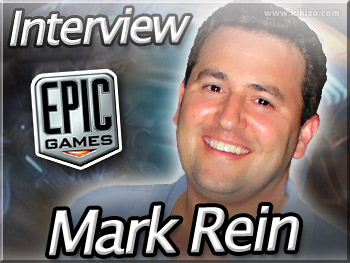Making Epic Games: Mark Rein Interview
Epic veep talks up Unreal Engine 3.0 and why it won't be coming to the Wii.
Page: 1 2
The first thing a lot of new console owners do is try to find that one game that really shows off the system, immediately justifying (if not to their partners then at least to themselves) the cost of upgrading. For many Xbox 360 owners, the decision of which game to buy has been easy: Gears of War.

Epic's futuristic tale of man-versus-alien is not only fun to play but the sheer technological prowess on display can't help but impress. Smothering earth tones come alive as over-the-top blood-splatters from downed enemy Locust stain the screen. And it all takes place in glorious high definition, letting you savour every corpuscle and shard of glass.
"Up until Gears of War, there wasn't really a game that had that really high end super-next-gen look to it. Because that's where we're always aiming," says Mark Rein, a vice president at the company.
He should know. Rein has been at Epic long enough to see the company flourish on PC (with its Unreal Tournament series) and on consoles. Hitting the moving target that is modern hardware isn't easy, but the process has been greatly simplified by Epic's underlying middleware Unreal Engine 3.0 software.
Up until the release of Gears of War, which was published by Microsoft last November, Epic was concerned mainly with making sure UE3 runs as well as it can on the Xbox 360. But UE3 does more than just make space marines jump.
The engine and its predecessors have been licensed out to dozens of companies who have used them to cut their development costs and allow them to spend less time fussing behind the scenes and more time working on their games.
Rein won't say how much developers need to pay to play, but insists that the notion that it's expensive is overblown. "People don't license UE3 because it costs them money," he says, "people license UE3 because it saves them money." The software tool's reach is expanding too.
Consider Naked Sky Entertainment. Last year the Los Angeles-based developer put out an Xbox Live Arcade game named RoboBlitz. The game casts you as Blitz, a robot out to save a space station from less-friendly robots, solving puzzles and kicking butt all at once. To create an Xbox Live Arcade game that would truly impress, Naked Sky gave Epic a call. And the developer is far from alone.
Microsoft, Midway, Ubisoft, Vivendi, Sony - just some of the companies that have studio-wide licences, allowing to them use UE3 in any of their games. Then there are the companies that come to Epic for one-off projects. The past success of the licensee is one of the factors Epic looks at in deciding how best to make money on the deal, whether that's from royalties, licensing fees, or a combination of the two.
Page: 1 2







 Satoru Iwata Video Interview - the late Nintendo president spoke with Kikizo in 2004 as 'Nintendo Revolution' loomed.
Satoru Iwata Video Interview - the late Nintendo president spoke with Kikizo in 2004 as 'Nintendo Revolution' loomed. Kaz Hirai Video Interview - the first of Kikizo's interviews with the man who went on to become global head of Sony.
Kaz Hirai Video Interview - the first of Kikizo's interviews with the man who went on to become global head of Sony. Ed Fries Video Interview - one of Xbox's founders discusses an epic journey from Excel to Xbox.
Ed Fries Video Interview - one of Xbox's founders discusses an epic journey from Excel to Xbox. Yu Suzuki, the Kikizo Interview - we spend time with one of gaming's most revered creators.
Yu Suzuki, the Kikizo Interview - we spend time with one of gaming's most revered creators. Tetris - The Making of an Icon: Alexey Pajitnov and Henk Rogers reveal the fascinating story behind Tetris
Tetris - The Making of an Icon: Alexey Pajitnov and Henk Rogers reveal the fascinating story behind Tetris Rare founders, Chris and Tim Stamper - their only interview? Genuinely 'rare' sit down with founders of the legendary studio.
Rare founders, Chris and Tim Stamper - their only interview? Genuinely 'rare' sit down with founders of the legendary studio. The History of First-Person Shooters - a retrospective, from Maze War to Modern Warfare
The History of First-Person Shooters - a retrospective, from Maze War to Modern Warfare